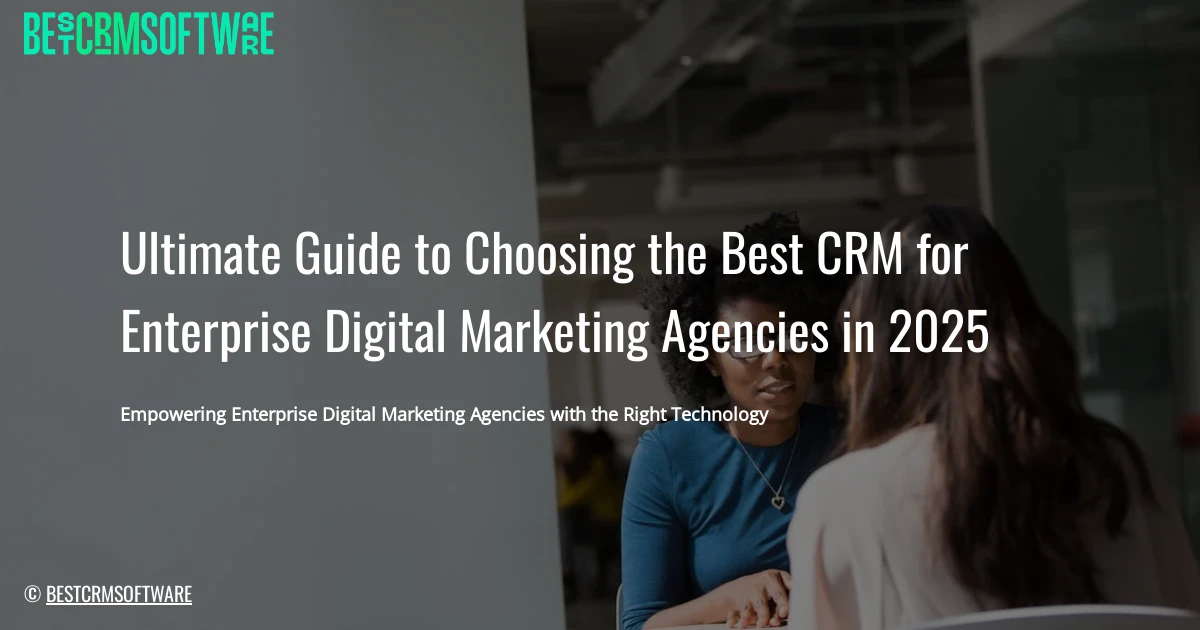Empowering Enterprise Digital Marketing Agencies with the Right Technology
Introduction: Understanding the Evolving Landscape of Digital Marketing for Enterprise Agencies
The digital marketing landscape is undergoing a constant evolution, especially for enterprise agencies catering to large clients with complex needs. Gone are the days of simple website development and email marketing campaigns. In 2025, agencies need to navigate an intricate ecosystem of channels, data points, and customer journeys.
Here’s a glimpse of the evolving landscape that dictates the need for the right CRM:
- Data Overload: Agencies grapple with a torrent of data from various sources – website analytics, social media, CRM platforms, marketing automation tools, and more.
- Customer-centricity: Businesses demand highly personalized experiences. This necessitates a deep understanding of customer behaviors, preferences, and interactions across multiple touchpoints.
- Integrated Marketing: Successful digital strategies rely on orchestrating campaigns across diverse channels, seamlessly connecting them to form cohesive customer journeys.
- Multi-platform Complexity: Agencies must navigate platforms like Google, Facebook, Instagram, LinkedIn, and more, requiring centralized management and analytics.
- Continuous Optimization: The key to staying ahead is constant adaptation. Agencies need to analyze data, refine strategies, and optimize campaigns in real-time to maximize results.
The CRM has evolved to become the cornerstone of this new reality, helping agencies efficiently manage data, analyze customer behavior, coordinate campaigns, and drive profitable growth. The challenge lies in finding the CRM that best meets the unique requirements of enterprise digital agencies, a task we explore in the sections that follow.
The CRM Imperative for Enterprise Digital Marketing Agencies
In the ever-evolving landscape of digital marketing, where client expectations are rising and competition is fierce, a robust CRM system is no longer a luxury – it’s a necessity. For enterprise-scale agencies, managing complex campaigns across diverse clients, multiple channels, and various teams requires a solution that goes beyond basic contact management. This section explores the unique challenges facing these agencies and outlines the critical features that make a CRM essential for their success.
Defining the Unique Needs of Large-Scale Digital Marketing Agencies:
Enterprise agencies juggle intricate projects involving:
- Multi-Client Management: Coordinating projects for multiple clients with unique requirements, deadlines, and budgets.
- Diverse Teams: Integrating the efforts of specialists across different disciplines (e.g., SEO, PPC, social media, content creation).
- Data-Driven Optimization: Analyzing vast datasets to refine strategies, measure campaign effectiveness, and identify new opportunities.
- Scalability and Customization: Adapting to ever-increasing client volume, new services, and ever-changing industry demands.
The Importance of Scalability and Customization:
The “one-size-fits-all” approach won’t work for enterprise agencies. The chosen CRM must:
- Scale Effortlessly: Handle exponentially growing data and users while maintaining seamless performance and user experience.
- Customize Processes: Align workflows, automation rules, and reporting mechanisms to mirror the agency’s specific operations and client needs.
- Integrate Seamlessly: Connect with existing tools and platforms to avoid siloed data and streamline operations.
Key Features to Look for in an Enterprise CRM:
The right CRM should empower enterprise agencies to:
- Manage Client Relationships Effectively:
- Unified client profiles encompassing detailed information, interaction history, project milestones, and communication logs.
- Customized dashboards for client-specific views, facilitating proactive account management and personalized service.
- Streamline Workflows and Automation:
- Automate repetitive tasks such as lead qualification, scheduling appointments, sending automated emails, and managing project timelines.
- Customize workflows to adapt to various team structures, service offerings, and project methodologies.
- Analyze Data for Enhanced Performance:
- Robust reporting and analytics tools to monitor campaign performance, identify key metrics, and measure ROI.
- Data visualization features to communicate insights and track progress effectively.
- Foster Team Collaboration and Communication:
- Real-time task management, shared notes, and internal communication features to facilitate seamless collaboration between team members.
- Collaboration tools for client engagement, enabling feedback gathering and efficient communication.
By recognizing the unique needs and priorities of large-scale agencies, and carefully selecting a CRM equipped with these features, these companies can truly leverage the power of technology to drive success in the competitive world of digital marketing.

© Pixabay
In-Depth Analysis: Top CRM Contenders
Salesforce: The Industry Giant and Its Offerings for Marketing Agencies
Salesforce, the undisputed heavyweight champion of the CRM world, stands as a formidable contender for enterprise digital marketing agencies in 2025. Its comprehensive platform offers an impressive suite of marketing tools specifically tailored for agencies, providing a holistic view of client interactions and campaign performance.
Here’s a snapshot of what Salesforce brings to the table:
- Marketing Cloud: A suite of powerful tools for managing marketing automation, email marketing, social media, and content creation. It integrates seamlessly with Salesforce Sales Cloud for a unified view of customer data and streamlined client interactions.
- Salesforce Pardot: A B2B marketing automation platform designed to nurture leads, track engagement, and generate qualified opportunities. It streamlines lead management, email marketing campaigns, and sales enablement, making it ideal for agencies working with B2B clients.
- Service Cloud: For agencies offering customer support services, Salesforce Service Cloud provides a comprehensive platform for managing support tickets, tracking customer issues, and delivering excellent customer service.
- AppExchange: Access a vast ecosystem of third-party apps that can be integrated into your Salesforce instance to cater to specific agency needs, such as social media scheduling, project management, and analytics.
Pros, Cons, and Pricing Structure of Salesforce for Enterprise Agencies
Pros:
- Scalability and Flexibility: Salesforce can be customized and scaled to fit the needs of any enterprise agency, accommodating diverse client demands and growing agency teams.
- Comprehensive Functionality: It offers a complete suite of tools for managing sales, marketing, customer service, and even analytics.
- Integration Capabilities: The platform seamlessly integrates with numerous other marketing tools and applications, ensuring smooth workflows and a consolidated data hub.
- Strong Support and Community: Salesforce has an extensive support system, including online resources, forums, and certified consultants, offering assistance throughout the learning and implementation process.
Cons:
- High Implementation Cost: Implementing Salesforce can be expensive, especially for larger agencies with complex requirements.
- Learning Curve: Navigating the complexities of Salesforce can be challenging for newcomers, requiring dedicated training and ongoing development.
- Potentially Overwhelming: The abundance of features and options may feel overwhelming to some users, particularly those new to CRM systems.
- Vendor Lock-in: While switching to Salesforce might offer a comprehensive solution, its highly integrated ecosystem can create vendor lock-in, limiting potential future options.
Pricing Structure: Salesforce offers a flexible pricing model, allowing agencies to pay based on the number of users, features, and modules required. Prices can vary widely depending on the specific Salesforce edition and chosen features, with a strong focus on customized enterprise solutions. Agencies will need to carefully consider their needs and budget when evaluating the total cost of ownership.
Microsoft Dynamics 365: A Powerful Alternative
Microsoft Dynamics 365: A Comprehensive Solution for Enterprise Growth
Microsoft Dynamics 365 isn’t just another CRM. It’s a robust, multifaceted platform designed to power enterprise-level growth. It goes beyond managing customer relationships, offering integrated solutions for sales, marketing, customer service, and operations. This comprehensive approach allows digital agencies to streamline their workflows, gain a holistic view of their clients, and ultimately deliver more impactful marketing campaigns.
Here are some key features that make Dynamics 365 stand out for agencies:
- Unified Marketing Automation: Reach your clients’ audiences across channels with powerful automation tools. Automate email campaigns, nurture leads, manage social media, and gain valuable insights into campaign performance.
- Intelligent Sales Insights: Equip your sales teams with powerful tools to identify potential clients, prioritize leads, and streamline the sales process. Dynamics 365 offers insightful data analysis, personalized dashboards, and forecasting tools to optimize sales performance.
- Seamless Customer Service Management: Provide excellent customer support through personalized experiences and efficient workflows. Dynamics 365 helps manage cases, track support requests, and analyze customer feedback to ensure customer satisfaction.
- Deep Integrations and Customization: Leverage Microsoft’s extensive ecosystem and integrations with popular tools like Microsoft Teams, Power BI, and LinkedIn. Additionally, Dynamics 365 offers extensive customization options, allowing you to tailor the platform to your specific agency needs.
Tailoring Dynamics 365 to Your Agency’s Specific Requirements
While Dynamics 365 provides a solid foundation, its true potential lies in its customization capabilities. Here’s how agencies can maximize Dynamics 365’s power:
- Industry-Specific Solutions: Microsoft Dynamics 365 offers industry-specific solutions designed for digital marketing agencies, like Dynamics 365 for Marketing, which caters specifically to agencies’ marketing needs. These pre-configured solutions streamline common processes and accelerate adoption.
- Customizable Workflows: Tailor the platform’s workflow engine to match your agency’s unique processes. Automate tasks, manage projects, and streamline client interactions for greater efficiency.
- Integration with Agency Tools: Connect Dynamics 365 with essential tools like project management platforms, content management systems, and analytics dashboards for a unified ecosystem.
- Dedicated Consulting Support: Partner with Microsoft or reputable consultants to optimize your Dynamics 365 implementation. Expert guidance ensures proper configuration, training, and continuous support, maximizing the platform’s benefits.
By leveraging these customization strategies, agencies can transform Dynamics 365 into a powerful tool that fuels their growth, strengthens client relationships, and drives long-term success.

© Christina Morillo
Adobe Experience Cloud: Unifying Marketing and CRM
Adobe Experience Cloud: A Marketing-Centric Approach to CRM
Adobe Experience Cloud (AEC) is more than just a CRM; it’s a marketing-centric platform designed to create holistic customer experiences across the entire buyer journey. Its robust CRM capabilities seamlessly integrate with its comprehensive suite of marketing tools, making it an ideal choice for enterprise digital marketing agencies aiming for unparalleled customer engagement and conversion rates.
AEC provides a single source of truth for customer data, enabling agencies to:
- Consolidate customer information: Gather and unify all customer touchpoints, from website interactions and email engagement to social media activity and purchase history.
- Develop data-driven insights: Gain a comprehensive view of customer behavior and preferences, fueling the creation of targeted campaigns and personalized experiences.
- Execute sophisticated marketing automation: Leverage automation tools to streamline workflows, automate repetitive tasks, and deliver highly personalized content at scale.
- Measure and optimize campaign performance: Track campaign effectiveness in real-time, optimize messaging and content, and drive continuous improvement.
Beyond traditional CRM functionalities, AEC excels in:
- Content creation and management: Streamline content creation, collaboration, and distribution across multiple channels.
- Analytics and insights: Powerful analytics dashboards provide real-time insights into customer behavior, allowing agencies to optimize marketing strategies and personalize customer experiences.
- Cross-channel orchestration: Manage all customer interactions across channels like email, website, mobile, social media, and even in-person touchpoints, delivering a seamless brand experience.
Leveraging Adobe’s Expertise in Customer Experience Management
Adobe has long been recognized for its expertise in customer experience management (CXM). Their experience cloud incorporates this know-how, offering features specifically tailored to address the unique needs of enterprise digital marketing agencies:
- AI-powered insights: Machine learning algorithms analyze customer data to predict behavior, identify emerging trends, and personalize interactions, allowing agencies to proactively tailor their strategies and content.
- Dynamic content creation: Leverage AEC’s content personalization tools to deliver highly tailored messages that resonate with individual customers and trigger desired actions.
- Extensive integrations: Seamlessly connect with other Adobe products, including Creative Cloud and Analytics, and easily integrate with third-party tools, providing unparalleled flexibility and scalability.
- Data security and privacy: AEC adheres to industry-leading data security protocols, ensuring customer data remains secure and confidential, crucial for agencies operating in a heavily regulated digital landscape.
By unifying marketing and CRM under a single, comprehensive platform, Adobe Experience Cloud empowers enterprise digital marketing agencies to optimize customer interactions, improve marketing performance, and ultimately achieve their business goals.
In 2025, AEC will remain a leading contender for agencies seeking a robust and adaptable platform that aligns with their commitment to delivering impactful and personalized customer experiences.
HubSpot: All-in-One Marketing and CRM Platform
HubSpot: A Popular Choice for Inbound Marketing and Beyond
HubSpot has carved a reputation as a leading CRM solution, particularly favoured by inbound marketing agencies. Its intuitive interface, robust marketing automation tools, and comprehensive suite of features make it a popular choice for businesses seeking to streamline their marketing efforts. While traditionally known for its strength in inbound marketing, HubSpot’s capabilities extend beyond, providing functionalities for sales, customer service, and even content management.
Evaluating HubSpot’s Suitability for Large Agencies
While HubSpot can be a great fit for small and medium-sized businesses, its suitability for large digital marketing agencies requires careful consideration. The platform offers:
Pros:
- Scalability: HubSpot offers a range of pricing plans and features that cater to organizations of varying sizes, ensuring it can scale with your agency’s growth.
- Comprehensive Marketing Automation: From lead capture to nurturing, segmentation, and personalized email campaigns, HubSpot offers powerful automation features to streamline your marketing efforts.
- Data Insights and Reporting: Access insightful reports on campaign performance, customer behaviour, and sales pipeline progress to make data-driven decisions and optimize your strategies.
- Strong Integrations: HubSpot seamlessly integrates with a variety of popular tools, expanding its functionalities and allowing you to create a unified system that fits your existing workflow.
- Excellent Customer Support: HubSpot provides comprehensive support resources, including dedicated account managers and an extensive knowledge base, making it easy to find answers and troubleshoot issues.
Cons:
- Cost: For large agencies managing a high volume of clients and complex marketing campaigns, the higher pricing tiers of HubSpot can become expensive, potentially exceeding your budget.
- Learning Curve: HubSpot’s vast array of features requires significant time investment to master. Agencies might require dedicated personnel for implementation and ongoing management.
- Customization Limits: While HubSpot provides options for customization, it can sometimes feel restrictive, limiting flexibility in creating fully unique solutions.
Ultimately, HubSpot’s suitability for your agency depends on your specific needs, budget, and organizational structure. Consider carefully whether its features align with your current workflow, the scale of your operations, and your marketing objectives.

© Elevate Digital
Pardot: B2B Marketing Automation Powerhouse
Pardot, a Salesforce company, has long been a champion of B2B marketing automation. As an enterprise digital marketing agency operating in 2025, you should consider Pardot for its robust capabilities and deep integration within the Salesforce ecosystem.
Pardot: A Salesforce Company Focused on B2B Marketing Automation
Pardot stands out by offering a comprehensive suite of features specifically designed for B2B marketing teams. These features include:
- Lead Management: Track and nurture leads through various stages of the sales funnel, using personalized content and automation.
- Email Marketing: Design and execute engaging email campaigns with powerful segmentation and A/B testing functionalities.
- Landing Pages and Forms: Create high-converting landing pages and forms, optimizing them for lead generation and conversion.
- Marketing Automation: Streamline repetitive tasks, personalize user experiences, and trigger automated actions based on specific user behavior.
- Analytics and Reporting: Gain insightful data on your marketing campaigns’ performance, helping you optimize and improve results.
Pardot’s focus on B2B needs ensures you get tools tailored to your unique challenges and requirements, allowing you to:
- Target specific audiences: Use advanced segmentation and targeting capabilities to reach your ideal customers effectively.
- Personalize communications: Deliver highly relevant content to individuals, increasing engagement and conversion rates.
- Improve lead quality: Score and qualify leads based on their interactions with your marketing materials, empowering sales teams.
Integrating Pardot with Your Existing Salesforce Ecosystem
As a Salesforce company, Pardot seamlessly integrates with Salesforce CRM, creating a single platform for managing sales, marketing, and customer interactions. This integration brings numerous advantages, including:
- Unified data: Gain a holistic view of customer interactions across both sales and marketing departments, eliminating data silos and providing a 360° customer picture.
- Streamlined processes: Automate workflows and handoffs between marketing and sales, leading to increased efficiency and smoother customer journeys.
- Real-time insights: Access real-time data on lead interactions and sales pipeline, facilitating better decision-making and proactive engagement.
Choosing Pardot empowers you to leverage a powerful B2B marketing automation tool within your existing Salesforce ecosystem, making it a compelling choice for enterprise digital marketing agencies in 2025.
Marketo: Driving Revenue Through Marketing Automation
Marketo stands as another leading player in the marketing automation arena, offering a comprehensive suite of tools designed to empower enterprise digital marketing agencies. With its powerful features and intuitive interface, Marketo provides a platform for streamlining marketing processes, nurturing leads, and ultimately, driving revenue growth.
Key Features and Benefits of Marketo for Enterprise Agencies
- Robust Automation Capabilities: Marketo shines with its ability to automate various marketing tasks, from lead nurturing and email marketing to campaign orchestration and social media engagement. This automation frees up valuable agency resources and allows them to focus on strategic initiatives.
- Data-Driven Insights and Analytics: Gain deep insights into campaign performance and customer behavior with Marketo’s comprehensive analytics dashboards. These data-driven insights help agencies optimize campaigns, personalize experiences, and measure return on investment (ROI).
- Engaging Lead Nurturing and Marketing Automation: Marketo enables agencies to design tailored lead nurturing workflows that deliver targeted content based on individual customer journeys. This personalized approach effectively engages prospects, moves them through the sales funnel, and ultimately increases conversion rates.
- Integration with Existing Tools: Marketo integrates seamlessly with other popular CRM platforms and marketing technologies, allowing agencies to create a unified marketing ecosystem. This interconnectedness allows agencies to leverage their existing data sources and streamline workflows for enhanced efficiency.
- Customer Segmentation and Targeting: Leverage Marketo’s sophisticated segmentation capabilities to target specific customer groups with tailored messages and campaigns. This personalized approach optimizes marketing spend, improves engagement, and drives higher conversions.
- Scalability for Growing Agencies: Marketo is built for scalability, supporting agencies as they grow and expand their marketing operations. The platform’s robust features and customization options can adapt to evolving business needs, providing a foundation for future success.
In Conclusion, Marketo provides a powerful and versatile platform for enterprise digital marketing agencies. Its comprehensive features, robust automation capabilities, and focus on data-driven insights enable agencies to drive revenue growth, optimize marketing campaigns, and provide superior customer experiences.

© fauxels
SharpSpring: An Affordable Yet Powerful Option
SharpSpring: A Flexible and Cost-Effective Solution for Agencies
SharpSpring positions itself as a robust CRM tailored specifically for marketing agencies, promising a blend of power and affordability. This platform offers a unique set of advantages, particularly for agencies handling a diverse range of clients:
- Comprehensive Marketing Automation: SharpSpring’s automation capabilities empower agencies to streamline routine tasks like lead nurturing, email marketing, social media engagement, and website optimization.
- Scalable for Multiple Clients: Its user-friendly interface allows agencies to manage multiple client accounts efficiently. The ability to create individual dashboards and tailor campaigns for each client ensures personalized experiences without compromising efficiency.
- Competitive Pricing: SharpSpring’s pricing model, with its emphasis on value-driven solutions, attracts agencies looking for cost-effective CRM options. This affordability empowers agencies to invest in expanding their services without the heavy financial commitment associated with more expensive solutions.
- Seamless Integration: Its robust integrations with various popular tools like Google Analytics, Mailchimp, and Zapier, further enhance its versatility.
Assessing the Strengths and Limitations of SharpSpring
SharpSpring boasts several noteworthy strengths that cater to agency needs:
- Easy-to-Use Interface: SharpSpring emphasizes a user-friendly interface designed for marketing professionals, simplifying onboarding and day-to-day usage, which translates to quicker adoption by teams and more productive workflows.
- Robust Reporting Capabilities: The platform offers comprehensive analytics dashboards, allowing agencies to track key performance indicators (KPIs) for each client campaign and make data-driven decisions.
- Content Marketing Tools: Its integrated content management system allows agencies to publish blogs, create landing pages, and manage social media campaigns from within the platform, further streamlining workflow.
However, SharpSpring also exhibits some limitations:
- Limited Advanced Features: While powerful, it might fall short of certain advanced features present in high-end CRM solutions, like detailed lead scoring models and sophisticated customer segmentation.
- Customization Limitations: While its customization options cater to a wide range of needs, certain aspects might not provide the level of personalization that some agencies desire.
- Support Limitations: Despite offering decent support resources, its responsiveness and expertise may fall short compared to larger platforms with dedicated support teams.
Ultimately, SharpSpring offers a strong foundation for digital marketing agencies looking for a versatile, cost-effective, and user-friendly solution. It strikes a balance between comprehensive functionality and affordability. However, agencies must weigh its strengths and limitations against their unique needs and priorities to ensure a suitable fit for their specific requirements.
ActiveCampaign: Streamlining Marketing and Sales Processes
ActiveCampaign: Combining Email Marketing, Marketing Automation, and CRM
ActiveCampaign stands out as a comprehensive solution that seamlessly integrates email marketing, marketing automation, and CRM capabilities. This trifecta makes it a strong contender for enterprise digital marketing agencies seeking a centralized hub for managing client relationships and optimizing campaigns.
Beyond its core functions, ActiveCampaign boasts several features designed specifically for agencies, including:
- White-Labeling: Agencies can rebrand the platform with their own logo and branding, presenting a seamless and professional experience to their clients.
- Multiple Account Management: ActiveCampaign empowers agencies to manage multiple client accounts with distinct branding, workflows, and data, ensuring a streamlined experience.
- Team Collaboration Tools: The platform allows for easy collaboration within teams, enabling efficient workflow management, communication, and delegation of tasks.
Exploring ActiveCampaign’s Suitability for Enterprise Agencies
Benefits:
- Unified View of Customer Data: ActiveCampaign provides a 360° view of customer interactions across email, website, and CRM activities. This unified data allows agencies to gain deeper insights, tailor their strategies, and personalize communications effectively.
- Advanced Automation: Automating marketing and sales workflows, from email sequences to lead nurturing, enables agencies to work smarter, not harder. This saves valuable time and allows for more focused efforts on high-impact activities.
- Scalability: ActiveCampaign offers a scalable solution to accommodate the growing needs of enterprise agencies with numerous clients and complex campaigns. Its flexible pricing plans provide room for expansion.
Drawbacks:
- Learning Curve: While ActiveCampaign offers intuitive features, its comprehensive functionality can require an initial learning curve for new users.
- Cost: ActiveCampaign’s pricing structure can be a factor, especially for agencies managing a high volume of clients. It’s crucial to weigh its features and capabilities against the investment.
- Limited Reporting Capabilities: While ActiveCampaign offers robust reporting options, some users might find its reporting functionality less sophisticated compared to other CRM platforms specifically built for analytics.
Conclusion:
ActiveCampaign presents a powerful solution for enterprise digital marketing agencies seeking to streamline their workflows, personalize communication, and boost client satisfaction. Its integrated features and focus on automation hold the potential to transform how agencies operate and deliver impactful marketing results. However, agencies should carefully evaluate their needs and weigh the platform’s benefits and drawbacks to determine if ActiveCampaign aligns with their specific goals and budget.

© fauxels
Ontraport: Scalability for Growing Agencies
Ontraport: A CRM and Marketing Automation Platform Built for Small Businesses
Ontraport is a well-established CRM and marketing automation platform that’s known for being a robust solution for small businesses. Its intuitive interface and comprehensive features cater to the needs of entrepreneurs and startups seeking to streamline their sales and marketing efforts. From email marketing to landing page creation, Ontraport offers a broad suite of tools for nurturing leads, driving conversions, and managing customer relationships.
Can Ontraport Scale to Meet the Demands of an Enterprise Agency?
While Ontraport shines in serving smaller companies, its scalability for enterprise digital marketing agencies is a topic of ongoing discussion. While Ontraport provides some features that address the requirements of larger teams, its limitations in managing vast data volumes and complex client projects might raise concerns.
Here are some considerations for evaluating Ontraport’s scalability for your enterprise agency:
Potential Challenges:
- Data Storage and Management: Ontraport may struggle to accommodate the massive datasets generated by a large agency managing multiple clients. The platform’s ability to efficiently handle complex reporting and data analysis needs for large-scale projects may be limited.
- User Management and Collaboration: Managing multiple users across diverse client projects within Ontraport can become challenging. Complex permission settings and communication coordination might become cumbersome for large teams.
- Integration Capabilities: While Ontraport offers some integrations, its overall integration landscape may not be extensive enough to cater to the wide range of marketing tools used by large agencies. This could create difficulties in maintaining a unified data ecosystem.
- Customization and Reporting: While Ontraport offers customization options, its limitations compared to dedicated enterprise CRM platforms may hinder agencies in tailoring the platform to their specific workflow and reporting requirements.
- Support and Scalability: While Ontraport offers support services, it may not be adequate for the unique challenges and rapid growth of enterprise agencies. Scaling their support to meet the demands of a large organization can pose a significant challenge.
Considerations for Large Agencies:
- Start small, assess and evaluate: Begin with a small-scale pilot project within a single client portfolio to assess Ontraport’s capabilities and limitations before committing to agency-wide implementation.
- Explore integration solutions: Invest in specialized integration solutions to bridge any gaps in functionality or compatibility. Utilize custom code and developer APIs to create a seamless ecosystem with other critical tools.
- Invest in training and onboarding: Dedicate adequate time and resources to train your team on Ontraport’s functionalities and navigate its interface effectively. Ensure your team possesses the knowledge to leverage the platform’s full potential.
- Consider alternative options: Carefully weigh Ontraport’s scalability against dedicated enterprise CRM platforms that offer more comprehensive capabilities and support for large-scale operations.
Overall, while Ontraport offers a strong set of features for small businesses, its suitability for enterprise digital marketing agencies requires careful consideration and analysis. Before deciding, evaluate its scalability against your agency’s specific needs and demands. Consider exploring more advanced CRM solutions specifically designed to support the intricate requirements of larger organizations and their dynamic projects.
Pipedrive: Sales-Driven CRM with Automation Features
Pipedrive: A Sales-Focused CRM with Pipeline Management at Its Core
Pipedrive is a popular choice for sales-driven businesses and agencies looking for a streamlined and visual approach to managing leads and sales pipelines. This CRM shines in its simplicity and user-friendliness, especially for teams with strong sales focus and a need to visually track progress through the sales funnel. Here’s why it’s worth considering:
- Intuitive Pipeline Management: Pipedrive’s core strength lies in its visually-driven pipeline management system. This allows you to visualize the sales process, easily track deals, and identify bottlenecks in the pipeline.
- Focus on Deal Progression: Pipedrive emphasizes the “sales-first” approach, prioritizing tasks, deadlines, and activities crucial to driving sales forward.
- Customizable Workflows: You can tailor Pipedrive’s pipelines and processes to your agency’s specific sales methodologies and workflows.
- Smart Email Features: The platform offers email tracking and scheduling features to ensure efficient communication and follow-ups.
Evaluating Pipedrive’s Marketing Automation Capabilities
While Pipedrive is primarily a sales CRM, it does offer some built-in marketing automation features. These features can be helpful for basic tasks like:
- Email Marketing: Pipedrive allows you to create basic email campaigns and schedule follow-ups based on lead engagement.
- Lead Scoring: You can set up basic scoring rules to prioritize leads based on factors like website visits or engagement with your emails.
- Lead Nurturing: While not as extensive as dedicated marketing automation tools, Pipedrive can help nurture leads through targeted communication based on their engagement and progress in the sales funnel.
Important Note: Pipedrive’s marketing automation capabilities are not as extensive or advanced as dedicated platforms like HubSpot or Marketo. If your agency heavily relies on complex marketing automation campaigns, more robust tools may be a better fit.
To determine if Pipedrive is the right fit for your agency, consider:
- Your Agency’s Focus: If sales is your primary focus and your marketing efforts primarily center around lead nurturing and targeted communication, Pipedrive could be a viable option.
- Need for Advanced Automation: If you require complex marketing automation features, such as intricate email sequences, lead segmentation, and campaign reporting, Pipedrive might not provide the level of sophistication you need.
- Integration Possibilities: Assess if Pipedrive integrates seamlessly with other marketing tools you currently use, like your website platform or email marketing software.
Ultimately, a deep dive into Pipedrive’s features, limitations, and integrations is crucial before making a final decision. Weigh the strengths of its pipeline management system against its marketing automation capabilities to decide if it aligns with your agency’s specific needs and growth goals.

© ICSA
Zoho CRM: Versatility and Integration Options
Zoho CRM: A Customizable CRM Solution with a Wide Range of Integrations
Zoho CRM is a highly versatile and customizable CRM solution that stands out with its extensive range of integrations. This platform provides a robust infrastructure for managing customer relationships, encompassing all aspects of the marketing lifecycle, from lead generation to conversion.
One of Zoho CRM’s most prominent advantages is its adaptability. The system allows for tailoring its features to match the unique requirements of each enterprise digital marketing agency, whether you need advanced analytics, automated workflows, or a seamless integration with your existing tech stack.
Zoho boasts a broad library of integrations with other essential marketing and business tools. It integrates effortlessly with platforms like:
- Marketing automation platforms: HubSpot, Mailchimp, Marketo
- Social media management tools: Hootsuite, Buffer
- Project management tools: Asana, Trello
- Analytics platforms: Google Analytics, Tableau
This interconnected ecosystem enables you to manage all aspects of your digital marketing activities within a single platform, streamlining your workflows and eliminating the need for disparate tools and data silos.
Understanding the Pros and Cons of Zoho CRM for Enterprises
While Zoho CRM offers undeniable advantages, it’s essential to assess its strengths and limitations to determine its suitability for your specific enterprise needs.
Pros:
- Highly customizable: Tailor the platform to fit your agency’s unique requirements and workflows.
- Extensive integration capabilities: Connect Zoho CRM to your existing marketing and business technology stack, optimizing efficiency and data management.
- Comprehensive suite of features: Access all necessary tools for lead management, customer interaction, marketing campaigns, and analytics.
- Scalability and adaptability: Zoho CRM scales seamlessly with your growing business, handling increased volumes of data and operations without compromising performance.
- Cost-effective pricing structure: A wide range of plans with various features cater to different agency sizes and budgets.
Cons:
- Learning curve: Implementing Zoho CRM may require some initial setup and training due to its extensive features and customization options.
- Potential for overwhelming functionality: The sheer volume of features might initially seem daunting, requiring strategic implementation and careful feature selection to maximize effectiveness.
- Limited support for custom development: While Zoho provides extensive API support, advanced custom development might require specialized knowledge and additional resources.
Ultimately, Zoho CRM’s effectiveness for enterprise digital marketing agencies depends on your specific requirements, the complexity of your operations, and your budget. If you value a platform with a robust integration network, customization flexibility, and cost-efficiency, Zoho CRM is a worthy contender for your consideration. However, remember to carefully analyze the platform’s pros and cons against your specific agency needs before committing.
Insightly: Managing Projects and Clients Effectively
Insightly: Unifying CRM, Project Management, and Business Intelligence
For enterprise digital marketing agencies in 2025, a powerful CRM isn’t just about managing contacts and pipelines; it’s about fostering seamless workflows across departments and delivering exceptional client experiences. This is where Insightly shines. Insightly isn’t simply a CRM, but a robust platform that blends CRM, project management, and business intelligence functionalities into a single, unified ecosystem.
Exploring Insightly’s Value Proposition for Agencies
- Project Management Made Effortless: Insightly allows agencies to effectively manage projects and track progress across all tasks. Features like task assignments, deadlines, and resource allocation empower teams to collaborate seamlessly and deliver projects on time and within budget.
- Streamlined Client Onboarding: Onboarding new clients is crucial for agency success. Insightly’s comprehensive CRM functionalities make it effortless to collect client data, automate communication, and set clear expectations from the outset.
- Centralized Client Communication: Forget about fragmented communication channels! Insightly offers a centralized hub for all client interactions. Track emails, calls, meetings, and activities to gain a complete view of your relationship with each client.
- Proactive Issue Management: Insightly’s built-in project management tools help agencies proactively identify and resolve issues before they become major problems. This ensures seamless project execution and boosts client satisfaction.
- Actionable Business Intelligence: With its advanced reporting and analytics capabilities, Insightly empowers agencies to make informed business decisions. Monitor project performance, track revenue, and analyze key metrics to optimize operations and drive growth.
- Scalability for Enterprise Needs: Insightly’s platform scales alongside your agency, seamlessly accommodating complex workflows and increasing team size without compromising performance.
In summary, Insightly empowers enterprise digital marketing agencies to streamline project management, foster effective client communication, and glean actionable insights that inform key business decisions. Its integrated platform ensures a seamless and intuitive workflow, making it a valuable asset for agencies seeking to maximize their productivity, profitability, and client satisfaction.

© Jopwell
Freshworks CRM: Enhancing Customer Relationships
Freshworks CRM: A Customer-Centric CRM with AI-Powered Insights
Freshworks CRM is a cloud-based customer relationship management (CRM) platform designed to simplify and streamline customer interactions. Its focus on user-friendliness and powerful AI-powered insights makes it an attractive option for digital marketing agencies looking to manage client relationships and boost campaign effectiveness.
Here are some of Freshworks CRM’s key features:
- Intuitive and Customizable Interface: Freshworks CRM offers a clean and intuitive interface that can be easily customized to suit the specific needs of a digital marketing agency.
- Centralized Customer Data: It provides a centralized platform for managing customer data, including contact information, interaction history, and campaign performance metrics. This allows agencies to have a comprehensive view of their clients and their engagement levels.
- AI-Powered Insights and Automation: Freshworks CRM leverages AI to provide agencies with actionable insights and automated workflows. This includes automated email marketing campaigns, personalized outreach, and predictive analytics that can identify opportunities and risks within customer relationships.
- Streamlined Communication: The platform facilitates seamless communication with clients through integrated channels such as email, chat, phone, and social media, fostering a more cohesive and collaborative client experience.
Assessing Freshworks CRM’s Suitability for Agency Workflows
While Freshworks CRM presents a robust offering, it’s crucial for agencies to assess its suitability for their specific workflows. Consider these key aspects:
- Integration with Marketing Tools: The platform’s ability to seamlessly integrate with essential digital marketing tools, such as Google Analytics, SEO tools, and social media platforms, is vital for agencies looking to gather and analyze data from multiple sources.
- Team Collaboration Features: The platform should enable effective team collaboration with features like shared task management, project tracking, and real-time communication within client projects.
- Scalability and Flexibility: Freshworks CRM should offer scalable options that can adapt to an agency’s growth and evolving needs, supporting various client sizes and project complexities.
- Customer Support and Resources: Agencies need reliable customer support and resources to navigate the platform and resolve any technical issues quickly and efficiently.
By considering these factors and conducting a thorough evaluation of Freshworks CRM, digital marketing agencies can determine its fit for their specific needs and ultimately, its potential to enhance their customer relationships and drive business growth in 2025.
Seamless Integration: Connecting Your Tech Stack
The heart of any effective marketing strategy lies in leveraging data and streamlining workflows. But within the intricate world of enterprise digital marketing agencies, the complexity of managing multiple platforms can become a significant hurdle. This is where seamless integration emerges as a critical element of success, and it’s particularly crucial when considering a CRM for your agency.
This section will delve into two key aspects of integration, revealing how a well-connected CRM can unlock unprecedented power for your agency:
1. Integrating Your CRM with Other Essential Marketing Tools
Imagine a scenario where your CRM houses your client’s contact data, while your marketing automation platform manages email campaigns, and your social media scheduler orchestrates organic content. Without seamless integration, you’re forced to manually sync information between platforms, leading to discrepancies, inefficient workflows, and potentially frustrated clients.
A modern CRM should boast powerful integrations with your core marketing tools:
- Marketing Automation: Platforms like Marketo, Pardot, and HubSpot integrate seamlessly with your CRM, enabling you to create personalized email nurture sequences, trigger automated actions based on customer behavior, and measure campaign effectiveness across all channels.
- Social Media: Tools like Hootsuite and SproutSocial offer valuable integrations, allowing you to monitor social media engagement, tailor messaging to individual contacts, and even automate posting based on CRM data.
- Analytics: Connecting your CRM to platforms like Google Analytics provides comprehensive insights into campaign performance. Track customer journeys, identify conversion paths, and analyze the impact of different marketing channels to optimize strategies and achieve greater ROI.
- Project Management: Integrate with platforms like Asana, Jira, or Monday.com to centralize client project information, track task progress, and ensure clear communication throughout the agency.
2. The Power of Data Synchronization and Automation
Seamless integration is not just about connecting different platforms; it’s about empowering your agency with the power of data synchronization and automation.
Data synchronization allows you to automatically update information across your entire tech stack in real-time. This means client information, campaign performance metrics, and engagement data are instantly accessible across your platforms, eliminating the need for manual reconciliation and ensuring everyone has access to the most up-to-date insights.
Automation takes integration to the next level, enabling you to set up complex workflows triggered by specific events. Imagine:
- When a lead converts on your website, their information automatically flows into your CRM and initiates an automated email sequence.
- When a client reaches a specific milestone in their customer journey, a personalized SMS reminder is sent to schedule a follow-up call.
- When a customer service ticket is resolved, the CRM automatically updates their contact record, ensuring everyone on your team has context for future interactions.
By connecting your CRM to other tools, you eliminate manual processes, unlock real-time data insights, and unleash the full potential of automation, paving the way for highly efficient workflows and data-driven decisions that will fuel your agency’s growth and success.

© fauxels
Data Privacy and Security: A Non-Negotiable Priority
As an enterprise digital marketing agency, you handle a wealth of sensitive data – not only your own agency’s information but also your clients’ most valuable assets: customer data. This makes data security and compliance an absolute priority when choosing a CRM system. The right CRM will safeguard your agency’s reputation and your clients’ trust while complying with increasingly stringent regulations.
The Role of Data Security and Compliance in CRM Selection
Data security should be a fundamental consideration throughout the CRM selection process. Here’s why:
- Protection Against Breaches: Data breaches can lead to significant financial losses, reputational damage, and legal repercussions. Choosing a CRM with robust security features is crucial for preventing unauthorized access, data theft, and cyberattacks.
- Compliance with Regulations: The landscape of data privacy laws is evolving rapidly. You must choose a CRM that aligns with industry-specific regulations like GDPR (General Data Protection Regulation) and CCPA (California Consumer Privacy Act) as well as emerging international standards.
- Customer Trust: Data breaches can erode customer trust in your agency and damage client relationships. A secure CRM demonstrates your commitment to protecting their data and helps maintain their confidence.
Protecting Your Agency and Your Clients’ Data
When evaluating CRM solutions, consider the following aspects of data privacy and security:
1. Encryption: The CRM should use encryption for data storage and transmission, ensuring that data remains secure even if intercepted. Look for strong encryption algorithms (e.g., AES-256) and protocols (e.g., TLS/SSL) implemented throughout the system.
2. Access Controls and Authentication: Implement strong user authentication mechanisms (e.g., multi-factor authentication) to limit unauthorized access. Granular access controls should allow you to define different levels of permission for employees, clients, and third-party vendors.
3. Regular Security Audits and Updates: The chosen CRM vendor should conduct regular security audits and updates to identify and fix vulnerabilities proactively. Make sure the CRM platform undergoes periodic security checks to comply with current regulations and standards.
4. Data Backup and Recovery: Data loss can be catastrophic. A reliable backup and recovery system should be in place to prevent data loss due to hardware failure, cyberattacks, or other incidents. Ensure the CRM provider offers data backup and disaster recovery capabilities.
5. Compliance with Industry Regulations: Ensure that the CRM vendor is compliant with applicable data privacy laws and regulations. Consider features that simplify compliance, such as data mapping tools, consent management features, and data retention policies.
By diligently focusing on data privacy and security when selecting a CRM, your agency can protect sensitive information, build client trust, and comply with evolving legal obligations. A secure CRM platform is not just a necessity for today’s digital landscape – it’s an investment in your agency’s long-term success.
Cost-Benefit Analysis: Maximizing Your Investment
Key Considerations for Budgeting and ROI When Choosing a CRM
Investing in a CRM is a significant decision for any enterprise digital marketing agency. To make sure you’re getting the best return on your investment (ROI), consider the following budget-related factors:
- Initial Investment vs. Long-Term Value: Don’t be solely focused on the cheapest option. Evaluate the long-term benefits, including increased efficiency, improved client relationships, and ultimately, boosted revenue. A higher initial investment may pay off in the long run.
- Hidden Costs: Explore the full price tag, including setup fees, integrations, customization, training, and ongoing support. Don’t underestimate the cost of onboarding staff and managing a new system.
- Scalability: Ensure your CRM can grow alongside your agency. Estimate future growth and choose a platform that can accommodate increased user accounts, data storage, and workflows without breaking the bank.
- Integration Costs: Determine if integrations with your existing marketing tools, analytics platforms, and other essential software are available and affordable. Unnecessary integration costs can significantly impact your budget.
- Customization Costs: Be mindful of the need for customization to tailor the CRM to your specific agency needs. Customizations can increase costs, but they might be essential for optimal functionality.
- Maintenance and Support: Calculate the ongoing costs for software updates, bug fixes, technical support, and potential feature upgrades. These expenses might be part of the initial subscription package or may come with additional charges.
Making Informed Decisions for Long-Term Success
When evaluating potential CRM options, don’t just consider the immediate cost. Focus on the ROI, which can be measured by:
- Improved Efficiency: Quantify the time and effort saved through automated workflows, task management, and centralized data. This increased efficiency can translate into handling more clients, improving client satisfaction, and boosting revenue.
- Increased Productivity: Analyze the impact of the CRM on individual and team productivity. How will better data visibility and collaboration contribute to faster project completion and reduced errors?
- Enhanced Customer Retention: Assess how the CRM’s features like client communication automation and personalized experiences will contribute to increased client satisfaction and loyalty.
- Stronger Sales Pipeline: Analyze how the CRM can enhance your sales process by facilitating lead generation, nurturing, and qualification. Measure the potential increase in conversions and revenue growth.
- Reduced Costs: Analyze the savings potential through streamlined processes, optimized campaign management, and reduced human error.
- Improved Reporting and Analytics: Calculate the value of having access to data-driven insights to make smarter decisions about client strategies and resource allocation.
Ultimately, choosing the right CRM is a strategic investment in your agency’s long-term success. By understanding your budget, analyzing the ROI potential of each solution, and factoring in scalability and ongoing costs, you can confidently make the best decision for your organization.

© Visual Tag Mx
Implementation and Beyond: Setting Your Agency Up for Success
Navigating the CRM Implementation Process: Tips for Success
Choosing the right CRM is just the first step. Successful implementation requires careful planning and execution. Here are key tips to ensure a smooth transition:
1. Define Clear Objectives:
* Establish specific goals for CRM usage – improving client engagement, streamlining workflows, boosting team productivity, etc. This will guide decision-making during implementation.
2. Identify Key Stakeholders:
* Involve key users from different departments (sales, marketing, account management) to gather diverse input and ensure alignment across teams.
3. Prioritize and Phase Implementation:
* Don’t attempt to implement every feature at once. Focus on core functionalities first, gradually adding complexity as your team gains familiarity.
4. Secure Necessary Resources:
* Allocate dedicated resources for implementation, including time, budget, and personnel. Consider external support if needed.
5. Test Thoroughly:
* Conduct extensive testing with real data to identify potential bottlenecks and fine-tune the system before full launch.
6. Stay Agile and Adaptable:
* Be prepared to adjust your strategy and approach as needed. Constant communication and collaboration are crucial.
Training Your Team and Ensuring Smooth Adoption
A successful CRM implementation depends on effective team training and buy-in.
1. Targeted Training:
* Provide clear, role-specific training materials and workshops that cater to individual skill levels and responsibilities.
2. Hands-on Learning:
* Use practice exercises and simulations to foster practical application of the CRM system.
3. Accessible Support:
* Offer ongoing support through FAQs, knowledge bases, and dedicated support personnel.
4. Continuous Feedback:
* Regularly solicit feedback from users to identify areas for improvement and address any roadblocks.
5. Incentivize Adoption:
* Encourage early adoption by highlighting benefits and rewarding positive usage patterns.
6. Embrace User Empowerment:
* Encourage ownership of the CRM system by empowering users to contribute to ongoing improvements and customized workflows.
By implementing these steps, your agency can maximize the value of its new CRM and achieve a seamless transition that leads to long-term success.
The Future of CRM: Innovation and Transformation
The agency world is constantly evolving, driven by technological advancements and changing client demands. To thrive in this dynamic landscape, digital marketing agencies need to stay ahead of the curve – and that includes embracing the future of CRM.
Emerging Trends and Future Predictions for CRM in the Agency World:
- AI-powered Automation: Expect to see more intelligent CRMs capable of automating tasks like lead scoring, campaign personalization, and client communication. This will free up your team to focus on higher-value activities.
- Data Integration and Unification: Agencies manage diverse client accounts with complex data sets. The future of CRM will prioritize seamless data integration from various sources, offering a single unified view of client interactions.
- Multi-channel Marketing Orchestration: The line between channels is blurring, with clients interacting through various touchpoints. Next-gen CRMs will help orchestrate a seamless, personalized experience across email, social media, SMS, and other channels.
- Predictive Analytics and Insights: CRMs will increasingly utilize sophisticated algorithms to analyze data and predict client behavior, allowing agencies to proactively optimize campaigns and provide tailored solutions.
- Collaborative Workflows and Project Management: Agencies will require CRM platforms that support team collaboration, task management, and project tracking. This ensures seamless workflow across different client accounts and project timelines.
Staying Ahead of the Curve in the Ever-Evolving CRM Landscape:
- Regularly Research and Evaluate: Don’t rest on your laurels. Keep abreast of new developments and emerging trends in the CRM space. Analyze new solutions and consider testing pilot implementations.
- Invest in Training and Development: Empower your team by investing in training programs on cutting-edge CRM features and capabilities. This will ensure they’re adept at utilizing the full potential of your CRM.
- Cultivate a Data-driven Mindset: Embrace data-driven decision-making. Leverage CRM analytics and insights to inform campaign strategies and client engagement.
- Prioritize Integration: The success of your CRM will depend on its seamless integration with other critical tools you use – marketing automation platforms, project management tools, and analytics platforms.
- Focus on Scalability and Adaptability: Choose a CRM solution that can scale alongside your agency’s growth and adapt to evolving client demands.
The future of CRM in the agency world holds immense potential for optimizing operations, enhancing client relationships, and ultimately, driving success. By staying proactive, embracing innovation, and adapting to the changing landscape, agencies can leverage CRM as a powerful tool to thrive in the dynamic digital marketing world of 2025 and beyond.

© Luis Quintero
Resources
THE BEST CRM SYSTEMS FOR 2025 – CHARITY DIGITAL
TOP CRM SOFTWARE AND SYSTEMS 2024/2025 – CLOUD CONSULTINGS
HOW TO CHOOSE THE BEST CRM FOR YOUR COMPANY – INNOVA MARKETING …
HOW BIG WILL BE THE CRM MARKET IN 2025? – 31WEST
TOP 5 CRM ENTERPRISE SOFTWARE [COMPARATIVE GUIDE]
BEST SOFTWARE FOR SMMA – YOUTUBE

